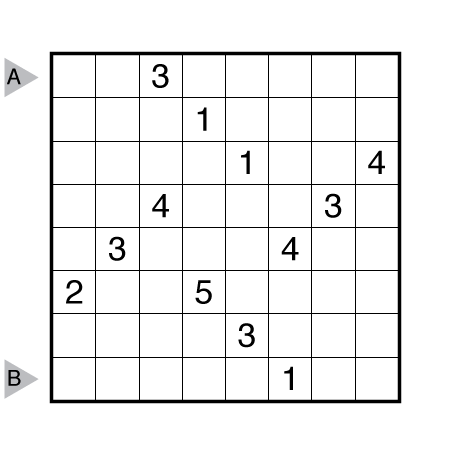2D Top Heavy Number Place by James McGowan

or solve online (using our beta test of Penpa-Edit tools; use tab to shift between number entry and shading modes.)
Theme: Clue Symmetry and Logic
Author/Opus: This is the 1st puzzle from guest contributor James McGowan.
Rules: Variation of Top Heavy Number Place. Fill the grid with digits from 1-5 so that each digit appears exactly once in every row and column. When digits touch, the digit to the left (if horizontal touching) or the digit to the top (if vertical touching) must always be bigger.
Answer String: Enter the values in each cell in the marked columns from top to bottom, using a capital X for blank cells.
Time Standards (highlight to view): Grandmaster = 5:30, Master = 10:00, Expert = 20:00
Solution: PDF; a solution video is available here.
Note: Follow this link for other less common Number Placement puzzles.

Nice job with this, James. I remember seeing the comment you made about this a little while back, and it actually works really well. While I really enjoyed the ones that Serkan made earlier this year (did he invent this type of puzzle?), I think this feels more like the puzzle’s optimal format.
Very nice! The additional constraint felt very natural while solving!
Yes, James, very well done! It was fun to see the discussion of this idea and then to see such a lovely execution fulfill the idea. I’m always pleased when the solving experience is just as elegant as the presentation.
I hope we’ll get to see more puzzles from you in the future, James!
-Carl
PS. The “Top Heavy” of the original puzzle title captured the rules so well. Adding “2D” here obviously helps indicate there’s more going on, but it’s too bad it doesn’t capture the direction. And obviously “Top-Left Heavy” doesn’t have the same ring. I almost wonder if it would make sense to rotate the grid 45-degrees clockwise so all the heaviness is back on top again? Would that totally mess with everyone’s Sudoku sense trying to see along rows and columns for unique numbers? (It might be likely to introduce confusing about what “rows” and “columns” mean in the rules.) Anyway, that’s not all that serious a suggestion…
Grant suggested this same rotation idea during test-solving. It fits the name much better, but the three votes I collected all thought it was a bad idea for solving, as diamond grids don’t work as well for tracking numbers for most people.
18:49.Tough one